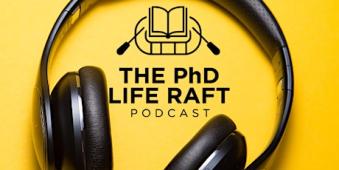Navigating the Academic Journey: The Power of Podcasts for Graduate Students

The graduate student journey is both exhilarating and challenging, with unique hurdles and triumphs at every turn. From navigating complex research projects to managing personal finances and commitments, graduate students face a myriad of challenges. If your experience is anything like mine, then you have more questions than you know what to do with and continue to have new questions every day during graduate school. Even though there may be many people you can turn to for advice, such as peers, mentors, and your advisor, you may be looking for additional sources to learn from. In my experience, this is where the power of podcasts comes in. In this blog post, I will explore how podcasts tailored specifically for graduate students can serve as invaluable companions, offering insights, advice, and a sense of community throughout their academic journey.
I first began listening to podcasts tailored specifically to graduate students when I started preparing for graduate school applications. I had been working in industry for almost four years at that point and was looking for advice from people who were either currently completing graduate school or obtained their degree and were experts on all things graduate school. This led me to the first podcast I will be recommending:
Hello PhD is a podcast with over 200 episodes that discuss all things graduate school admissions, rotations, classes, qualifying papers / exams, research, dissertation, job-hunting, and more. The podcasters, Drs. Joshua Hall and Daniel Arneman, first met in 2002 during their grad school admissions interview and ended up choosing the same graduate program. Looking back at the countless conversations that helped guide their paths, they wanted to ease the way for students, postdocs, faculty, and scientists that navigate these same hard questions every day.
Personally, this was the perfect introduction to this niche area of podcasts, as they provided very specific, applicable advice while not taking themselves too seriously. They usually start the podcast with the craft beer they are drinking at the moment and share personal anecdotes about their personal life. As a first-generation college student, getting my bachelor's degree felt intimidating, as such applying for a doctoral degree felt like I was working tremendously hard on a prom proposal for someone completely out of my league. Once I received my acceptance letter from Tufts University and began graduate school, I continued to turn to this podcast to learn practical advice and strategies to navigate the complexities of graduate studies.
The PhD Life Raft is a podcast with over 100 episodes that focus on sharing insights and experiences around some common issues like mental health, writing, time management, precariousness, imposter syndrome, professional relationships and work-life balance.
The PhD Life Raft offers a space to discuss pressing issues, explore possible strategies, and provide sources of support for your doctoral journey. The podcaster, Dr. Emma Brodzinski, draws on her experience both as an academic and her training as a therapist to offer support to PhD researchers and advice for navigating academia.
The podcaster in The PhD Life Raft has an adorable English accent and is not afraid to share personal details, such as her spending a lot of time crying during her Ph.D. journey. I love how much she sheds light on the importance of mental health during graduate school through her episodes and her own journey. Additionally, I find hearing a range of perspectives from a diverse set of guest speakers helps open my eyes to opportunities and strategies that I had not thought of before listening. I like to think of them as virtual mentors guiding graduate students through the nuances of academic endeavors. If you are interested in exploring other podcasts about the graduate school experience that are less established but still worth looking into, check out How to PhD and PhD Survival podcasts.
Another big topic that I turn to podcasts to learn about is personal finance, however, the more general finance podcasts often provide generic advice that is not actionable at this point in my life. I mean how helpful is advice if the only way you can apply it is with a six-figure salary? Luckily, I came across a game-changer of a personal finance podcast (below) that has already saved me money by employing some of the tools the episodes discuss.
Personal Finance for PhDs is a podcast with over 100 episodes that dive into the unique money challenges that stem from low stipend/salary during the years of graduate school and postdoc training.
The podcaster, Dr. Emily Roberts, mission is to inspire and empower early-career PhDs to make the most of their money. Through interviews with fellow graduate students, postdocs, and PhDs with Real Jobs you learn everything from budgeting and frugality to investing, debt repayment, and beyond. This podcast serves as your beginner to advanced education in personal finance.
Dr. Roberts' passion for personal finance is rooted in her experience as a graduate student which lets her speak from the position of a more experienced and knowledgeable peer with tons of practical tips to share. As a result, when I listen to the tailored advice that Emily and her guests share instead of giving myself a hard time for not knowing that strategy, I feel like I am a part of a supportive community of people who understand the challenges I am facing and want to help.
The last subject matter that I will cover but is just as important as the others is career development. I know one of the scariest questions you can ask a graduate student, especially one with a dissertation to write, is when they will finish their degree. Regardless of when your timetable is, there will come a time when we all will need to build the bridge between graduate school and a career. If you need some inspiration when you begin brainstorming, I recommend listening to these two podcasts:
PhD Career Stories is a podcast with over 130 episodes that feature interviews with Ph.D. holders from various fields, sharing their career journeys and offering advice on how to navigate the transition from graduate school to the next step in your career.
The podcaster, Dr. Tina Perrson, discovered that numerous PhD students and postdocs experience stress because of uncertainty about their professional futures and struggle to effectively position themselves in the job market. To this end, they wanted to help by creating a podcast where PhDs share stories, successes, and failures of their career development after completing their doctorate.
The GradBlogger is a podcast with over 80 episodes that provides academic researchers, graduate students, and those with PhD degrees or other higher academic degrees the tools and strategies to build an online business using blogging, podcasting, and video.
The podcaster, Dr. Chris Cloney, offers advice and interviews graduate students and academics on topics such as building an academic business, personal branding as an expert in your field, building a research team, utilizing social media, monetizing your blog, becoming an independent researcher who is self funded through your business, and much more.
By the conclusion of this blog post, I aspire to have convinced you of the transformative potential of podcasts for graduate students. From providing tailored advice and insights to fostering a supportive community, podcasts serve as invaluable resources throughout the academic journey. By tuning into these podcasts, I hope you gain the knowledge, inspiration, and confidence you need to navigate your paths with resilience and success.



